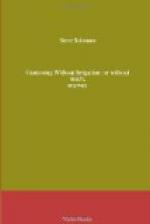In Water-Wise Vegetables I assume that my readers already are growing food (probably on raised beds), already know how to adjust their gardening to this region’s climate, and know how to garden with irrigation. If you don’t have this background I suggest you read my other garden book, Growing Vegetables West of the Cascades, (Sasquatch Books, 1989).
Steve Solomon
Chapter 1
Predictably Rainless Summers
In the eastern United States, summertime rainfall can support gardens without irrigation but is just irregular enough to be worrisome. West of the Cascades we go into the summer growing season certain we must water regularly.
My own many-times-revised book Growing Vegetables West of the Cascades correctly emphasized that moisture-stressed vegetables suffer greatly. Because I had not yet noticed how plant spacing affects soil moisture loss, in that book I stated a half-truth as law: Soil moisture loss averages 1-1/2 inches per week during summer.
This figure is generally true for raised-bed gardens west of the Cascades, so I recommended adding 1 1/2 inches of water each week and even more during really hot weather.
Summertime Rainfall West of the Cascades (in inches)*
Location April May June July Aug. Sept.
Oct.
Eureka, CA 3.0 2.1 0.7 0.1 0.3 0.7 3.2
Medford, or 1.0 1.4 0.98 0.3 0.3 0.6 2.1
Eugene, or 2.3 2.1 1.3 0.3 0.6 1.3 4.0
Portland, or 2.2 2.1 1.6 0.5 0.8 1.6 3.6
Astoria, or 4.6 2.7 2.5 1.0 1.5 2.8 6.8
Olympia, WA 3.1 1.9 1.6 0.7 1.2 2.1 5.3
Seattle, WA 2.4 1.7 1.6 0.8 1.0 2.1 4.0
Bellingham, WA 2.3 1.8 1.9 1.0 1.1 2.0 3.7
Vancouver, BC 3.3 2.8 2.5 1.2 1.7 3.6 5.8
Victoria, BC 1.2 1.0 0.9 0.4 0.6 1.5 2.8
Source: Van der Leeden et al., _The Water Encyclopedia,_ 2nd ed., (Chelsea, Mich.:Lewis Publishers, 1990).
Defined scientifically, drought is not lack of rain. It is a dry soil condition in which plant growth slows or stops and plant survival may be threatened. The earth loses water when wind blows, when sun shines, when air temperature is high, and when humidity is low. Of all these factors, air temperature most affects soil moisture loss.
Daily Maximum Temperature (F)*
July/August Average
Eureka, CA 61
Medford, or 89
Eugene, or 82
Astoria, or 68
Olympia, WA 78
Seattle, WA 75
Bellingham, WA 74
Vancouver, BC 73
Victoria, BC 68
Source: The Water Encyclopedia.
The kind of vegetation growing on a particular plot and its density have even more to do with soil moisture loss than temperature or humidity or wind speed. And, surprising as it might seem, bare soil may not lose much moisture at all. I now know it is next to impossible to anticipate moisture loss from soil without first specifying the vegetation there. Evaporation from a large body of water, however, is mainly determined by weather, so reservoir evaporation measurements serve as a rough gauge of anticipated soil moisture loss.




